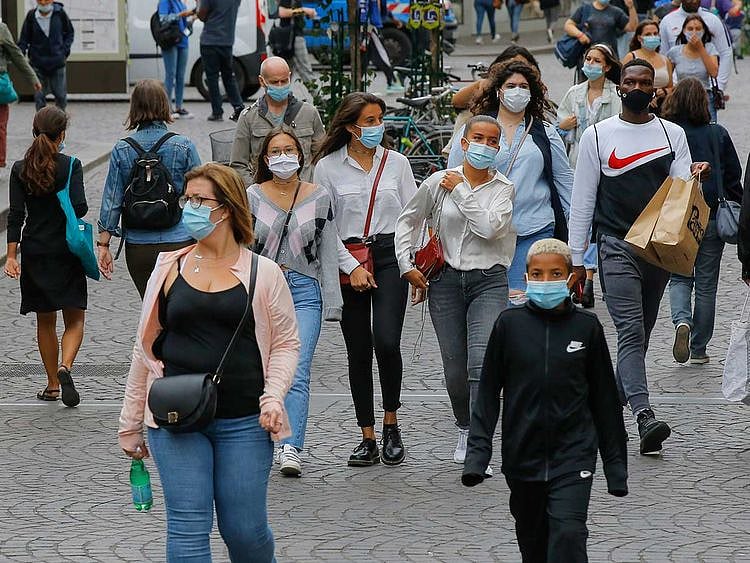Though it feels like a decade ago, it was in fact only around the beginning of this year when we first heard of the rumblings of a mysterious virus in Wuhan that was killing people there. We paid little attention to what then seemed like a piddling news story about the ordeal of an obscure city in Central China.
But soon after the virus began to wander freely around every corner of the earth, we knew that it was a fear-inducing demon that, despite its size — one thousandth the width of an eyelash — it extinguished life with terrifying speed as we stood helpless before it, putty in its hands, as it were.
Covid-19, as we went on to call it, has not only extinguished life (fatalities worldwide reached the one million milestone in September) but upended our quotidian norms. It has distanced human beings from each other, separating them into islands of privacy and silence, robbing them of the means and meaning that had conjoined their humanity as one.
Consider this one case in point. After a new resurgence recently of virus cases in the United Kingdom and the Republic of Ireland, authorities there introduced more draconian social distancing rules — they closed pubs or limited access to them. That surely must rank as the mother of all under the belt blows. Here’s why.
Oh, the horror, the horror!
A pub, you see, may be a place where you go to drink, but alcohol consumption is ancillary to other endeavours there. You go to a pub, very simply, to bond. For working class people, a pub is a home away from their Housing Commission home where they feel socially — and yes, also spiritually — nurtured after the stress of a day’s work. Well, in the UK, these gathering places have now either been closed or have had their opening hours drastically curtailed. In the Republic of Ireland, the roughly 7,000 pubs there, historically a central part of cultural life, were ordered completely shuttered last Friday. (Denying the Irish access to their pubs? Oh, the horror, the horror!)
It’s happening in our part of the world as well. The Arab world, traditionally a non-drinking culture, has its own counterpart of a pub, known as the maqha, or coffee-house (forget tacky coffee-chains) whose manners of ceremonial exchange go back to the 17th century. A maqha is frequented by all classes of society and all manner of people, including Zo’ran al- Hay, the local wise guys. It is a place for social congregation, bonding and letting-go, where disputes are settled, business deals are worked out and matters of mutual interest are discussed, and where patrons also play backgammon, listen to music, smoke water pipes, air petty grievances, read the papers and, well, drink coffee, the world’s favourite beverage.
While some maqhas, like Al- Fashawi’s in Cairo, founded roughly 250 years ago — which makes it the oldest extant maqha in the Arab world — attracted benign artists, musicians, poets and writers, other more recently founded maqhas, like Faisal’s in Beirut, are lively, contentious hangouts, hotbeds of public discourse and calls for radical change, that attracted intellectuals who, after all subjects had been exhausted, turned to denigrating and slandering local politicians.
Well, all that, whether in pubs or in maqhas, is history now, with everyone uncertain if any of it would ever be resurrected.
Assault on our internal psychic economy
Back to Covid-19, which is behind the retrenchment of the ability of human beings to connect with each other — an assault on our internal psychic economy, for as humans we are wired to connect with others, and the need for that connectedness is innate to our being. When that need is denied us, we feel the vacuum gnawing away at us like a raw wound. We feel the need to touch and be touched by others, whether it’s a warm embrace, a reassuring hand on the shoulder, a congratulator slap on the back or a kiss given by a friend, Arab-fashion, on both cheeks.
Denied that, we are denied, scientists aver, the release in our system of oxytocin, also known as the “cuddle hormone” or “love hormone”, which plays a major role in facilitating in humans benign feelings of trust and attachment.
Today, all over the world — for the virus has shown itself to be the great equaliser — we suffer the pain of solitary confinement, as it were, the pain of losing those unconscious, immemorial intimacies we had known of yore.
Unreason reigns. Now left alone, to self-address, even our primary metaphors have turned to jargon. Save us, Dear Lord.
— Fawaz Turki is a journalist, lecturer and author based in Washington. He is the author of The Disinherited: Journal of a Palestinian Exile
Sign up for the Daily Briefing
Get the latest news and updates straight to your inbox
Network Links
GN StoreDownload our app
© Al Nisr Publishing LLC 2026. All rights reserved.
